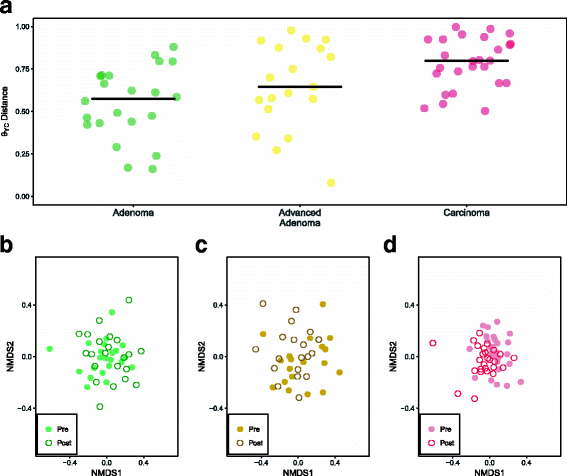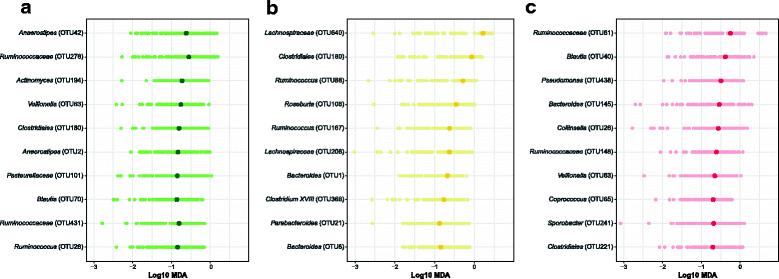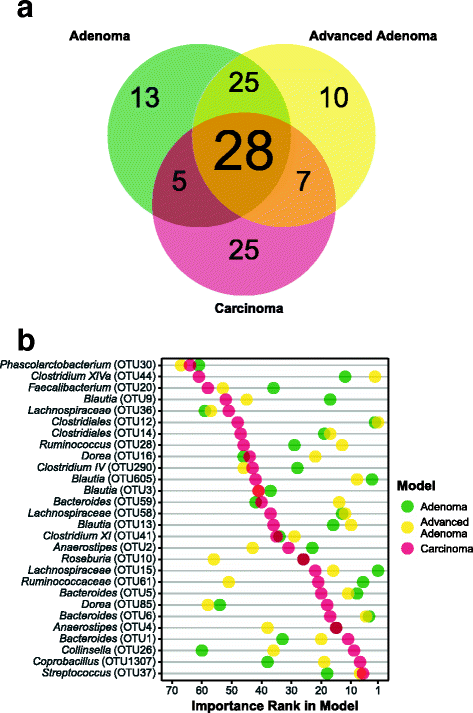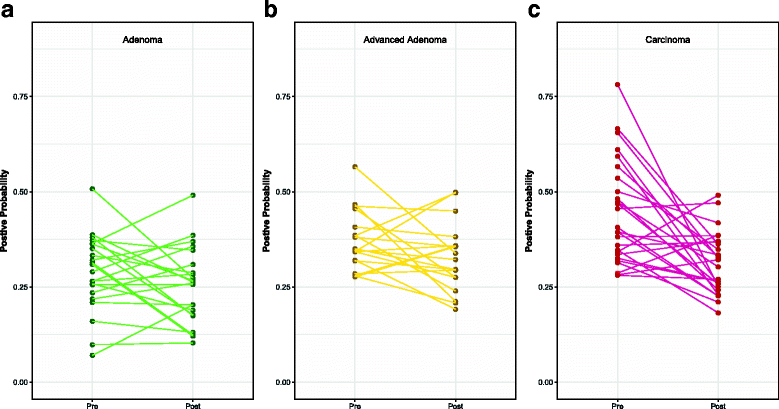Normalization of the microbiota in patients after treatment for colonic lesions
- PMID: 29145893
- PMCID: PMC5689185
- DOI: 10.1186/s40168-017-0366-3
Normalization of the microbiota in patients after treatment for colonic lesions
Abstract
Background: Colorectal cancer is a worldwide health problem. Despite growing evidence that members of the gut microbiota can drive tumorigenesis, little is known about what happens to it after treatment for an adenoma or carcinoma. This study tested the hypothesis that treatment for adenoma or carcinoma alters the abundance of bacterial populations associated with disease to those associated with a normal colon. We tested this hypothesis by sequencing the 16S rRNA genes in the feces of 67 individuals before and after treatment for adenoma (N = 22), advanced adenoma (N = 19), and carcinoma (N = 26).
Results: There were small changes to the bacterial community associated with adenoma or advanced adenoma and large changes associated with carcinoma. The communities from patients with carcinomas changed significantly more than those with adenoma following treatment (P value < 0.001). Although treatment was associated with intrapersonal changes, the change in the abundance of individual OTUs in response to treatment was not consistent within diagnosis groups (P value > 0.05). Because the distribution of OTUs across patients and diagnosis groups was irregular, we used the random forest machine learning algorithm to identify groups of OTUs that could be used to classify pre and post-treatment samples for each of the diagnosis groups. Although the adenoma and carcinoma models could reliably differentiate between the pre- and post-treatment samples (P value < 0.001), the advanced-adenoma model could not (P value = 0.61). Furthermore, there was little overlap between the OTUs that were indicative of each treatment. To determine whether individuals who underwent treatment were more likely to have OTUs associated with normal colons we used a larger cohort that contained individuals with normal colons and those with adenomas, advanced adenomas, and carcinomas. We again built random forest models and measured the change in the positive probability of having one of the three diagnoses to assess whether the post-treatment samples received the same classification as the pre-treatment samples. Samples from patients who had carcinomas changed toward a microbial milieu that resembles the normal colon after treatment (P value < 0.001). Finally, we were unable to detect any significant differences in the microbiota of individuals treated with surgery alone and those treated with chemotherapy or chemotherapy and radiation (P value > 0.05).
Conclusions: By better understanding the response of the microbiota to treatment for adenomas and carcinomas, it is likely that biomarkers will eventually be validated that can be used to quantify the risk of recurrence and the likelihood of survival. Although it was difficult to identify significant differences between pre- and post-treatment samples from patients with adenoma and advanced adenoma, this was not the case for carcinomas. Not only were there large changes in pre- versus post-treatment samples for those with carcinoma, but also these changes were toward a more normal microbiota.
Keywords: Colorectal cancer; Microbiota; Polyps; Risk factor; Treatment.
Conflict of interest statement
Ethics approval and consent to participate
The University of Michigan Institutional Review Board approved this study, and all subjects provided informed consent. This study conformed to the guidelines of the Helsinki Declaration.
Consent for publication
Not applicable.
Competing interests
The authors declare that they have no competing interests.
Publisher’s Note
Springer Nature remains neutral with regard to jurisdictional claims in published maps and institutional affiliations.
Figures




References
-
- Siegel RL, Miller KD, Jemal A. Cancer statistics, 2016. CA: Cancer J Clin. 2016;66:7–30. - PubMed
-
- Howlader N, Noone AM, Krapcho M, Miller D, Bishop K, Kosary CL, Yu M, Ruhl J, Tatalovich Z, Mariotto A, Lewis DR, Chen HS, Feuer EJ, Cronin KA, (eds).SEER Cancer Statistics Review, 1975-2014, National Cancer Institute. Bethesda, MD. https://seer.cancer.gov/csr/1975_2014/.
MeSH terms
Substances
Grants and funding
LinkOut - more resources
Full Text Sources
Other Literature Sources
Medical

